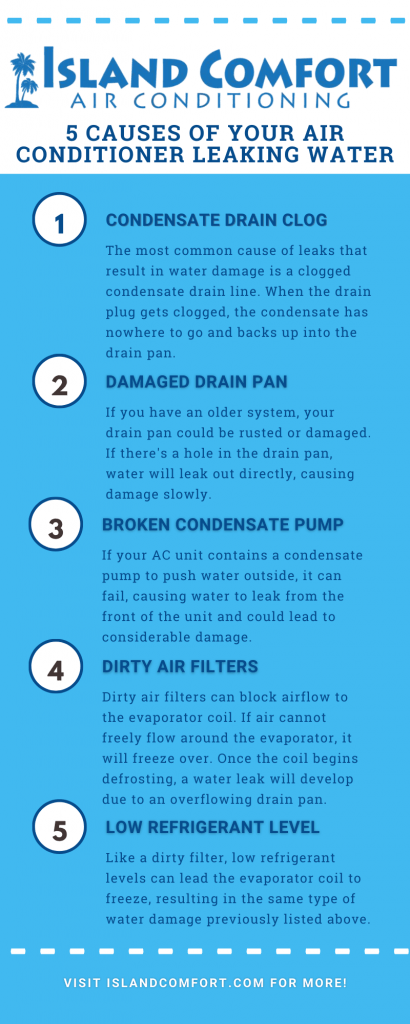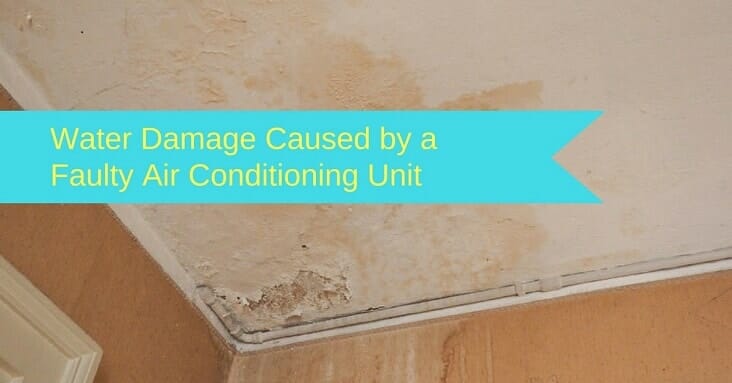22May 2024
Welcome to your guide on how to troubleshoot air conditioning leaks and water damage! Whether you’re dealing with a small leak or a more serious issue, knowing how to identify and address the problem can save you time, money, and frustration. From checking the condensate line to inspecting the air filters, we’ll walk you through the steps to keep your AC system in top shape and prevent any potential water damage in your home. Let’s get started on ensuring your air conditioner is running smoothly and efficiently!
How To Troubleshoot Air Conditioning Leaks And Water Damage
Have you noticed water leaks around your air conditioning unit? Are you worried about potential water damage? In this article, we will guide you through the process of troubleshooting air conditioning leaks and preventing water damage. By following these steps, you can keep your home cool and dry all summer long!

This image is property of islandcomfort.com.
Common Causes of Air Conditioning Leaks
Air conditioning leaks can be caused by a variety of factors. Some of the most common reasons for leaks include:
- Clogged condensate drain line
- Frozen evaporator coils
- Dirty air filters
- Improper installation
If you are experiencing leaks, it’s important to identify the root cause in order to effectively address the issue.
Clogged Condensate Drain Line
“One of the most common causes of air conditioning leaks is a clogged condensate drain line. Over time, dirt, debris, and algae can build up in the drain line, causing water to back up and leak into your home. Cleaning the condensate drain line can help prevent leaks and water damage.”
To clean the condensate drain line, you can use a wet/dry vacuum to suction out any blockages. Alternatively, you can flush the drain line with a mixture of water and vinegar to remove buildup.
Frozen Evaporator Coils
“If your air conditioning unit is leaking water, frozen evaporator coils may be to blame. When dust and debris accumulate on the coils, they can freeze and cause excess water to leak out. Regular maintenance and cleaning of the evaporator coils can prevent freezing and leaks.”
To prevent frozen evaporator coils, you should check and replace your air filters regularly. You can also schedule professional maintenance to ensure that the coils are clean and functioning properly.
Dirty Air Filters
“Dirty air filters can restrict airflow and cause your air conditioning unit to work harder than necessary. As a result, the evaporator coils can become cold and frozen, leading to leaks. By replacing your air filters regularly, you can improve indoor air quality and prevent leaks.”
To avoid leaks due to dirty air filters, check your filters every 1-3 months and replace them as needed. High-efficiency filters can help improve air quality and reduce the risk of leaks.
Improper Installation
“In some cases, air conditioning leaks may be caused by improper installation of the unit. If the unit is not level, drains are not installed correctly, or the ductwork is damaged, water can leak into your home. Hiring a professional HVAC technician to inspect and install your unit can prevent leaks and water damage.”
If you suspect that improper installation is causing leaks, contact a licensed HVAC technician to assess the situation and make any necessary repairs.
Preventing Water Damage
Preventing water damage caused by air conditioning leaks is essential for maintaining the integrity of your home. By taking proactive measures, you can avoid costly repairs and keep your living space safe and comfortable.
Regular Maintenance
“Regular maintenance of your air conditioning unit is key to preventing leaks and water damage. Schedule annual inspections with a licensed HVAC technician to check for any signs of leaks, clogs, or damage. By addressing issues early on, you can avoid extensive water damage and costly repairs.”
During a maintenance visit, the technician will inspect all components of your air conditioning system, clean the coils, change the filters, and ensure that the unit is functioning properly. This preventive measure can extend the lifespan of your unit and save you money in the long run.
Monitor Humidity Levels
“Monitoring humidity levels in your home can help prevent condensation and water leaks. High humidity can cause excess moisture to accumulate in the air conditioning unit, leading to leaks and water damage. By using a dehumidifier or adjusting the thermostat, you can maintain a comfortable and dry indoor environment.”
Keep an eye on humidity levels in your home and take action if they exceed 50-60%. By controlling humidity, you can prevent mold growth, wood rot, and other issues associated with water damage.
Insulate Pipes and Ductwork
“Proper insulation of pipes and ductwork can prevent leaks and water damage. Exposed pipes and ducts can sweat and condense, leading to water buildup and potential leaks. By insulating these components, you can maintain a consistent temperature and reduce the risk of water damage.”
Consider adding foam insulation to your pipes and ductwork to prevent condensation and leaks. This simple yet effective measure can protect your home from water damage and improve the efficiency of your air conditioning system.

This image is property of happyhiller.com.
Final Thoughts
By following these tips for troubleshooting air conditioning leaks and preventing water damage, you can keep your home cool, dry, and comfortable throughout the summer months. Remember to address leaks promptly, invest in regular maintenance, and monitor humidity levels to protect your home from water damage. If you are unsure about how to troubleshoot or repair air conditioning leaks, consult a professional HVAC technician for assistance. Stay cool and worry-free with a properly maintained air conditioning system!

This image is property of www.servicemasterbyzaba.com.
